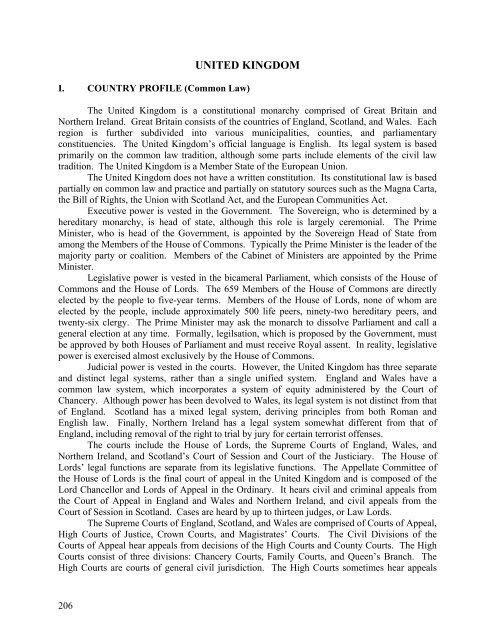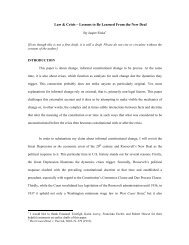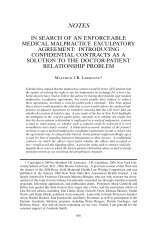Guide to Foreign and International Legal Citations - New York ...
Guide to Foreign and International Legal Citations - New York ...
Guide to Foreign and International Legal Citations - New York ...
Create successful ePaper yourself
Turn your PDF publications into a flip-book with our unique Google optimized e-Paper software.
206<br />
UNITED KINGDOM<br />
I. COUNTRY PROFILE (Common Law)<br />
The United Kingdom is a constitutional monarchy comprised of Great Britain <strong>and</strong><br />
Northern Irel<strong>and</strong>. Great Britain consists of the countries of Engl<strong>and</strong>, Scotl<strong>and</strong>, <strong>and</strong> Wales. Each<br />
region is further subdivided in<strong>to</strong> various municipalities, counties, <strong>and</strong> parliamentary<br />
constituencies. The United Kingdom’s official language is English. Its legal system is based<br />
primarily on the common law tradition, although some parts include elements of the civil law<br />
tradition. The United Kingdom is a Member State of the European Union.<br />
The United Kingdom does not have a written constitution. Its constitutional law is based<br />
partially on common law <strong>and</strong> practice <strong>and</strong> partially on statu<strong>to</strong>ry sources such as the Magna Carta,<br />
the Bill of Rights, the Union with Scotl<strong>and</strong> Act, <strong>and</strong> the European Communities Act.<br />
Executive power is vested in the Government. The Sovereign, who is determined by a<br />
hereditary monarchy, is head of state, although this role is largely ceremonial. The Prime<br />
Minister, who is head of the Government, is appointed by the Sovereign Head of State from<br />
among the Members of the House of Commons. Typically the Prime Minister is the leader of the<br />
majority party or coalition. Members of the Cabinet of Ministers are appointed by the Prime<br />
Minister.<br />
Legislative power is vested in the bicameral Parliament, which consists of the House of<br />
Commons <strong>and</strong> the House of Lords. The 659 Members of the House of Commons are directly<br />
elected by the people <strong>to</strong> five-year terms. Members of the House of Lords, none of whom are<br />
elected by the people, include approximately 500 life peers, ninety-two hereditary peers, <strong>and</strong><br />
twenty-six clergy. The Prime Minister may ask the monarch <strong>to</strong> dissolve Parliament <strong>and</strong> call a<br />
general election at any time. Formally, legilsation, which is proposed by the Government, must<br />
be approved by both Houses of Parliament <strong>and</strong> must receive Royal assent. In reality, legislative<br />
power is exercised almost exclusively by the House of Commons.<br />
Judicial power is vested in the courts. However, the United Kingdom has three separate<br />
<strong>and</strong> distinct legal systems, rather than a single unified system. Engl<strong>and</strong> <strong>and</strong> Wales have a<br />
common law system, which incorporates a system of equity administered by the Court of<br />
Chancery. Although power has been devolved <strong>to</strong> Wales, its legal system is not distinct from that<br />
of Engl<strong>and</strong>. Scotl<strong>and</strong> has a mixed legal system, deriving principles from both Roman <strong>and</strong><br />
English law. Finally, Northern Irel<strong>and</strong> has a legal system somewhat different from that of<br />
Engl<strong>and</strong>, including removal of the right <strong>to</strong> trial by jury for certain terrorist offenses.<br />
The courts include the House of Lords, the Supreme Courts of Engl<strong>and</strong>, Wales, <strong>and</strong><br />
Northern Irel<strong>and</strong>, <strong>and</strong> Scotl<strong>and</strong>’s Court of Session <strong>and</strong> Court of the Justiciary. The House of<br />
Lords’ legal functions are separate from its legislative functions. The Appellate Committee of<br />
the House of Lords is the final court of appeal in the United Kingdom <strong>and</strong> is composed of the<br />
Lord Chancellor <strong>and</strong> Lords of Appeal in the Ordinary. It hears civil <strong>and</strong> criminal appeals from<br />
the Court of Appeal in Engl<strong>and</strong> <strong>and</strong> Wales <strong>and</strong> Northern Irel<strong>and</strong>, <strong>and</strong> civil appeals from the<br />
Court of Session in Scotl<strong>and</strong>. Cases are heard by up <strong>to</strong> thirteen judges, or Law Lords.<br />
The Supreme Courts of Engl<strong>and</strong>, Scotl<strong>and</strong>, <strong>and</strong> Wales are comprised of Courts of Appeal,<br />
High Courts of Justice, Crown Courts, <strong>and</strong> Magistrates’ Courts. The Civil Divisions of the<br />
Courts of Appeal hear appeals from decisions of the High Courts <strong>and</strong> County Courts. The High<br />
Courts consist of three divisions: Chancery Courts, Family Courts, <strong>and</strong> Queen’s Branch. The<br />
High Courts are courts of general civil jurisdiction. The High Courts sometimes hear appeals
















